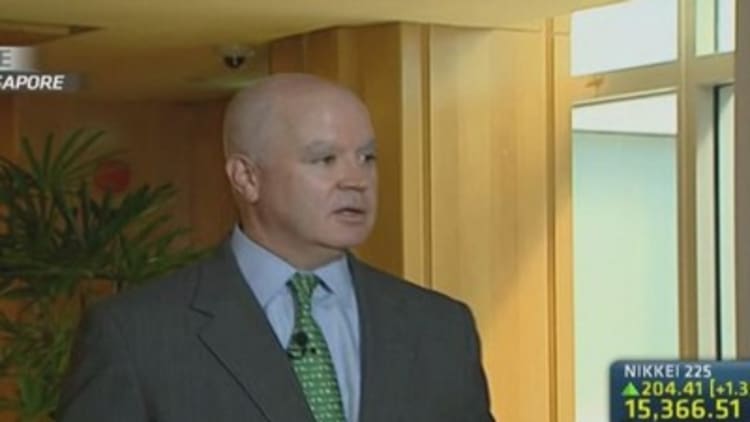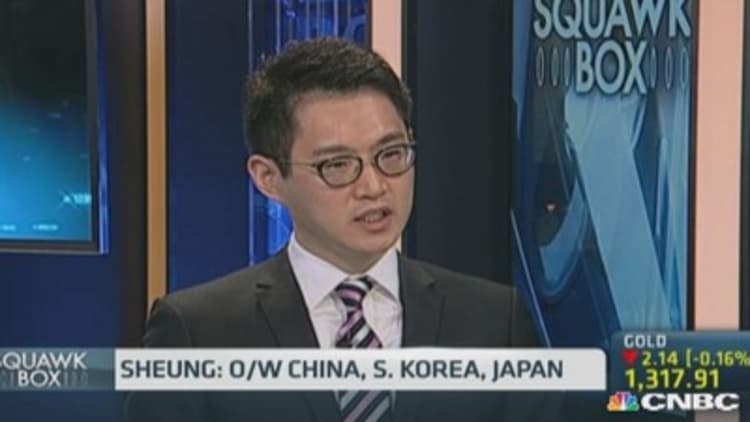Emerging market bonds have been a hot trade this year as prices fell in the wake of convulsions following last year's "taper tantrum," but some analysts say the rally may have run its course.
"The year started badly for emerging markets, but we are no longer lagging the developed markets," said Harsh Agarwal, head of Asia credit research at Deutsche Bank. "I don't think we are, at this stage, in a bargain hunting situation because things have recovered a lot and quite quickly."
Read More Will yields on high-yield bonds get even lower?
Last year, emerging market assets convulsed after the U.S. Federal Reserve first broached its plan to begin tapering its asset purchases, spurring fund outflows amid concerns liquidity would take a hit.

Since then, while assets in some specific countries, such as Turkey, Russia and South Africa, have lagged broader gains, others, such as India and Indonesia, have recovered to touch all-time highs, Agarwal noted.
Some analysts are backing away from their previous bullish calls.
After last year's "overdone" selloff, emerging market bonds have now rallied for five straight months, noted Regis Chatellier, senior credit strategist for emerging markets at Societe Generale, in a note Monday.
Read More Why low bond yields are all you deserve
Societe Generale estimates net inflows into the segment from retail and institutional investors into emerging market sovereign bonds at $16.7 billion in the first half of the year.
Credit spreads on U.S. dollar-denominated emerging market bonds are back to pre-tantrum levels from early 2013, he noted.
"Emerging market spreads are no longer providing substantial pick up versus the U.S. high-yield and investment-grade sectors," Chatellier said.
Read More Global investors pare risky bond holdings, brace for sell-off
"The combination of a dovish monetary policy from the Fed (at least far less hawkish than originally anticipated), the high amount of bond amortizations and tight spread valuations in the U.S. investment grade and high yield sectors created a virtuous circle for emerging market credit during the first half of 2014," Chatellier said. "But the virtuous circle may no longer be at play in the third quarter."
To be sure, despite gains, Deutsche Bank's Agarwal doesn't think it's time to get out yet.

"Until you have interest rate concerns come back, which is likely a next-year story, I think emerging markets broadly should be ok," he said.
Read More The world is running short on ... green bonds
"From a valuation perspective, if you look at the gap between emerging markets and developed markets, it still looks attractive," he added. "If you compare where Asia trades versus the U.S. and Europe, or where Latin America trades versus the U.S. and Europe, there's still a lot of differential, which I think should keep coming down over the next three to six months," Agarwal said.
Pimco is also sticking with emerging market bonds after turning positive at the end of 2013.
"We still think that there will be good upside opportunities," Eve Tournier, head of pan-European credit portfolio management at Pimco, said in a blog posting last week. "Emerging market debt continues to represent an important source of yield and potential growth. Many emerging market debt issuers with strong underlying fundamentals and high growth prospects offer higher yields than their developed market counterparts."
Read More Five bond market risks to worry about: Pimco
For example, she said Russia, particularly its quasi-sovereign corporates, offers "compelling relative value" as the selloff on the conflict with Ukraine may be overdone.
Others are only now getting in to the sector.
"We have shied away from emerging market bonds for many, many years, but this year is the first time in the last four years that we've started buying emerging market bonds again," said Jonathan Liang, senior portfolio manager for fixed income at AllianceBernstein. He likes U.S.-dollar denominated corporate and local-currency government bonds, citing a preference for Brazil and Mexico.
"Local currency debt in Brazil is giving you low double-digit rates. These are government bonds we're talking about. We think it's not a bad deal," he said. He also noted that U.S. dollar denominated Brazilian corporate bonds are out-yielding U.S. corporate bonds.
—By CNBC.Com's Leslie Shaffer; Follow her on Twitter @LeslieShaffer1

